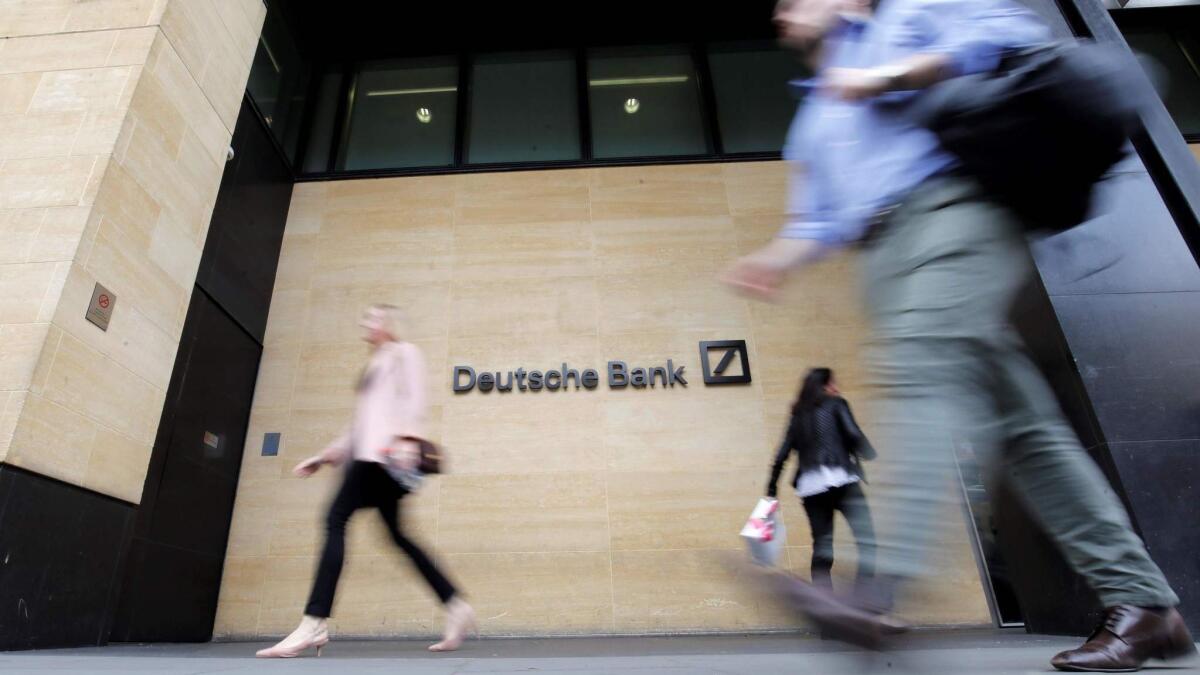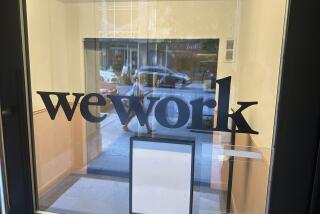Deutsche Bank’s big overhaul leaves investors unimpressed

Deutsche Bank’s big overhaul plan — under which it is abandoning its global trading ambitions and axing as many as 18,000 jobs — fell flat with investors.
The German lender’s shares slid 5.4% in Frankfurt on Monday, wiping out early gains after announcing its plan Sunday.
The profit goals are too ambitious, analysts said. They noted that a bank that has consistently disappointed shareholders in recent years is focusing its attention on a famously competitive home market and the relatively low-margin business of servicing companies’ routine financing needs. Dividends will be withheld this year and next, and its capital position will be reduced to pay for the restructuring that’s forecast to cost $8.3 billion — equal to more than half its market value.
“Its strategy has significant execution risk and leaves it with little room for error on capital,” Berenberg analyst Eoin Mullany wrote in a note. The restructuring “does not change the fact that [Deutsche Bank] is exposed to an industry in structural decline (investment banking) and one in which the marginal pricing is to be break-even (German retail).”
The plan went into effect first thing Monday as employees around the world got notice that they were losing their jobs. In London, equities traders were told their badges would be disabled by 11 a.m. By 10 a.m., dozens were seen leaving the building near London Wall with thick white envelopes detailing their exit packages. Some were crying as they left. More than a few headed to the nearby Balls Brothers restaurant and bar and were seen quaffing prosecco and beer.
Deutsche Bank, once Europe’s dominant financial institution, was virtually out of options. So, one year before its 150th anniversary, it conceded it could no longer go head-to-head with the giants of global finance and decided to do what it was created for in the 19th century: serve Germany’s big companies.
The overhaul sets up a corporate bank “to focus our bank on where we are most competitive,” Chief Executive Christian Sewing said Monday. The “days of spectacular ambition” in investment banking are over, he said, with the goal to make the division “fiercely competitive, well respected and sustainably profitable.”
Such focus wasn’t on anyone’s mind 20 years ago when staff in Frankfurt were served hot dogs and American beer to celebrate the completion of the $9-billion purchase of Bankers Trust Corp. in the United States. That deal made Deutsche Bank the world’s largest financial services company. Today, it wouldn’t be the biggest in Belgium.
When the 49-year-old Deutsche Bank lifer was named CEO in April 2018, he said his mission wasn’t to change its global strategy but only to implement it more effectively. Even though the bank’s leaders had discussed at the time closing the entire equities division, they demurred for the same reasons they had previously. There was concern that shuttering the unit would damage other parts of the investment-banking business, such as underwriting initial public offerings.
It soon became clear to Sewing that the more cautious approach wasn’t working. Credit-rating company S&P Global cut the level shortly after Sewing took over, and a raid on the bank’s headquarters in Frankfurt drove up funding costs and irritated clients. The share price dropped 25% between Sewing’s appointment and the end of the year.
Hope that anything would change for the better on its own soon evaporated. When someone asked the global head of equities, Peter Selman, at a meeting of the investment bank’s executive committee for an estimate of when the unit would return to a profit, he first refused to give an answer and then suggested it certainly wouldn’t be before 2022, according to a person briefed on the matter.
Then in early 2019, the annual results for 2018 came in: Equities trading racked up a loss of about $750 million on revenue of only about $2.2 billion last year. Convinced the bank could no longer afford to wait for a turnaround, Sewing started laying the groundwork for the move.
The CEO relied on a team of trusted lieutenants including Christiana Riley, the investment bank’s chief financial officer, who was promoted in Sunday’s reshuffle.
They analyzed business by business to establish how profitable — or unprofitable — each one was, the people said. Identifying the associated costs of each unit was a key component of the review, including each one’s cost of funding and its share in the expenses for back-office staff — for example, for anti-money laundering and compliance — that can’t be strictly allocated to just one unit.
They concluded that equities trading was too expensive and a turnaround would take too long. Crucially, the team decided it would be possible to eliminate the business without inflicting overly painful damage to one of the bank’s operations closest to Sewing’s heart: the transaction bank, which provides trade finance, cash management and hedging products to companies.
With work on the new restructuring plan picking up after the talks with Commerzbank collapsed, Sewing announced “tough” measures to come at the bank’s annual general meeting in May. Just a few weeks later, he unveiled his new vision built around reduced revenue from volatile trading business and growing income from more stable activities.
Initial reactions in Germany were favorable. The labor union ver.di -- a powerful voice thanks to its many seats on Deutsche Bank’s supervisory board -- said it “welcomes” the reduction of the investment bank, though it also said it will insist job cuts in Germany happen in a “socially compatible” way.
The market reaction Monday highlighted the new strategy’s risks. Sewing has decided to avoid a capital increase and is instead drawing down Deutsche Bank’s capital to fund some of the eye-popping restructuring costs. While the pullback from equities is expected to make the bank less risky, lowering its need to hold capital, a thinner capital buffer could worry regulators.
The plan also continues to test the patience of shareholders who haven’t seen a decent return on equity since 2011 as Sewing is eliminating the dividend for the current year and next. He has promised about $5.6 billion worth of buybacks and dividends starting in 2022.
“We have to provide our strong business the oxygen to prosper while withdrawing it” from less promising areas, Sewing said.






